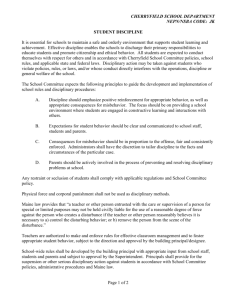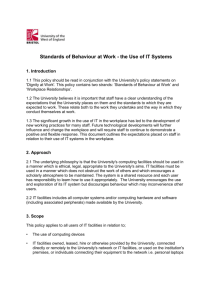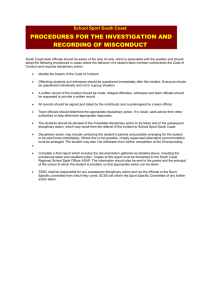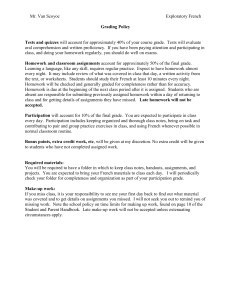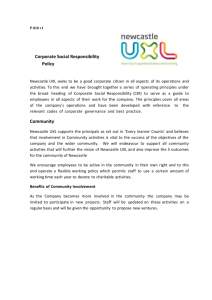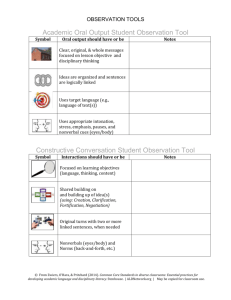rules & regulations - Abertay Intranet
advertisement
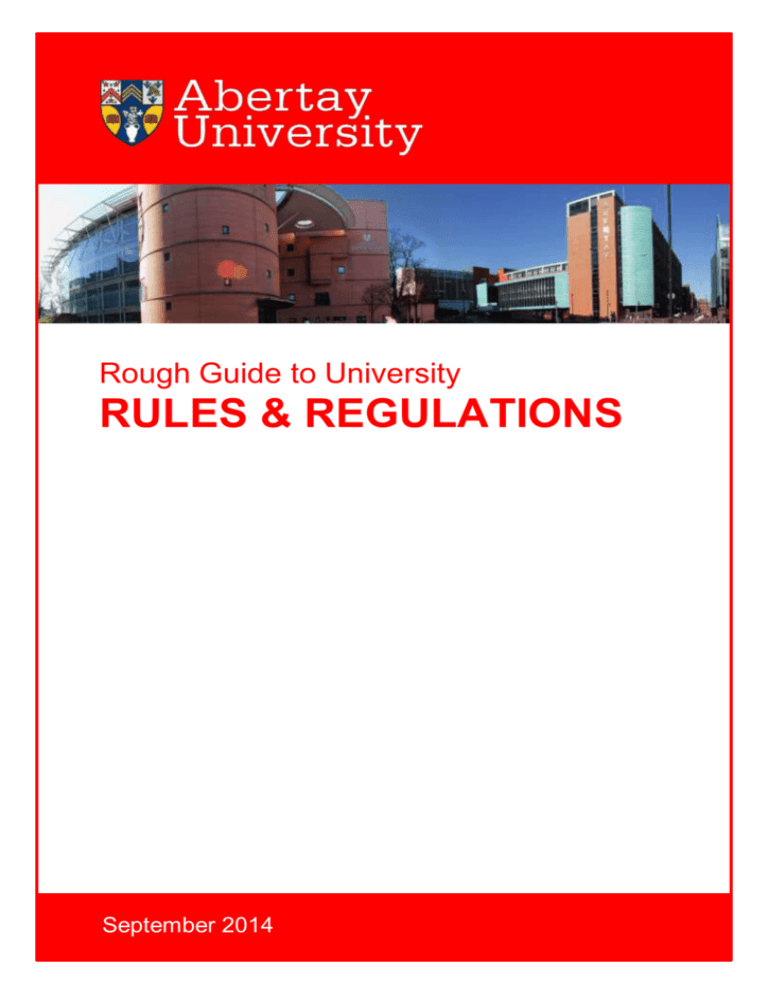
Rough Guide to University RULES & REGULATIONS September 2014 Foreword The purpose of rules and regulations By enrolling at Abertay University, you agree to abide by our rules and regulations. The University tries to avoid unnecessary rules, but some are needed so that we can live and work together to the benefit of everyone. Rules are also there to protect our community against individuals whose behaviour does not reach the standard that we expect and to safeguard the University’s name and reputation. We therefore ask all students and staff to observe certain standards of behaviour and to meet certain obligations. In the main, you are unlikely to encounter problems if you use your common sense, have a sensible appreciation of what is right and wrong, show respect for other students and staff, do not misuse the facilities available to you and respect the University and its property. About this booklet The purpose of this booklet is to provide a Rough Guide to some of the most important areas covered by the University’s regulatory policies and procedures. It is important that you familiarise yourself with the policies themselves and are aware of the consequences of infringing them. This Guide also contains information on what to do in situations where you feel that your educational experience has been unfairly affected by the actions of one or more individuals, be they staff or fellow students. This booklet is not intended to take the place of all of the University’s regulatory policies and procedures. Rather, it aims to ensure that you are aware of the broad areas in which we have rules and regulations and to let you know where you can find more detailed information on them. Nigel Seaton Principal & Vice-Chancellor August 2014 1 Index Further information & advice 3 Absences & other personal difficulties 3 Academic appeals 3 Academic deceit & plagiarism 4 Academic regulations 4 Attendance 5 Bullying & harassment 5 Children in the University 6 Complaints 6 Computer systems & facilities 6 Copyright 7 Data Protection Act 7 Discipline 7 Disclosure Scotland 8 Equality and Diversity Policy 8 Fees & other charges 9 Health & safety 9 Intellectual Property Policy 9 The Bernard King Library 10 Matriculation cards 10 Residences 10 Security & lost property 10 Smoking 11 Suspension 11 Whistleblowing 11 2 Further information & advice Throughout this Guide, where a detailed policy or procedure document exists on a particular topic, it is highlighted in bold typeface. The full text of each of these documents is available from the ‘Abertay Knowledge’, the area of the University’s online portal which is the information source for all regulations, policies and procedures. If you have any problems accessing them, would like a paper copy, or need further information and advice, please contact the Support Enquiry Zone (SEZ) in The Bernard King Library. Absences & other personal difficulties Most students encounter few major problems during their studies, but the unexpected can happen and you may experience a change in circumstances which affects your ability to study or attend classes. Health, relationships, family and financial problems are the most common. If you experience difficulties, it is important that you speak to your Programme Tutor or Student Services as soon as possible. Contact can be made by email, by telephone, or in person via SEZ in the Library, who can arrange an appointment for you. If the problem is related to your health, you must consult a doctor at the time, because medical evidence may be required later on if you need to defer assessment. Academic appeals U Under certain circumstances you have the right to submit an appeal against an adverse decision you have received from an Assessment Board. These circumstances are explained in the University’s Academic Appeals Procedure and you have to prove that either: (a) your performance was affected by illness or some other reason which you were unwilling or unable to divulge prior to the Board; or (b) your assessments were not conducted in accordance with the relevant regulations or an administrative error or other irregularity occurred. If you think you have grounds for appeal, contact Student Services or the Students’ Association for advice and help. After your results are published, there are clearly defined and very strict timescales within which you must submit notice of your intention to appeal. 3 Academic deceit & plagiarism The University takes very seriously its responsibilities for ensuring that all work submitted by students is a result of their own unaided efforts. It therefore deals severely with incidences of copying, plagiarism and other forms of cheating in coursework and examinations. Such ‘academic deceit’ is an offence under the University’s Student Disciplinary Code and is dealt with either through School arrangements or the Student Disciplinary Committee. You will receive detailed advice and guidance about what constitutes academic deceit from academic staff at the beginning of your course. However, it is important that you understand this and that you read the University’s Academic Deceit Policy and Procedures. Academic regulations There are detailed assessment regulations in the University’s Academic Regulations. A useful introduction to the main points that are relevant to students can be found in the Rough Guide to the Modular Scheme. In particular you should note that you must complete registration for all modules in which you expect to be assessed by the end of the third week of each term. Any requests for amendments thereafter must be submitted to the Registrar in writing and will only be accepted in exceptional circumstances. It is vital that you ensure that your module registrations are correct, because you will only receive credit for those modules for which you are properly registered, regardless of which modules you have attended or submitted assessments for. You must familiarise yourself with the University’s rules for the conduct of examinations, which are be aware that you may only use a calculator if the examination paper specifically allows you to. Any electronic devices capable of displaying text or being used for communicating outside the examinations room (such as mobile phones, ipods and tablets) must be switched off before you enter. During your exam, these items must not be placed on your desk or in your bag, but must be left where indicated by the exam invigilator. The University has no responsibility for the safekeeping of your personal property. 4 Attendance Once you have enrolled at the University, you must attend regularly, carry out the work assigned to you and sit any exams that are required. Students whose attendance record is poor are much more likely to fail than those who attend regularly. The University has systems in place to monitor attendance and will take action to follow up students whose attendance record is poor. Bullying & harassment The University seeks to ensure that all individuals are treated with dignity and respect. It regards harassment as unacceptable and has a Personal Harassment Policy designed to protect its students and staff. Harassment can take many forms, but is generally regarded as behaviour which: • is unwanted by the recipient; • and/or is hostile and/or offensive to the recipient or to others who have been exposed to it; • and/or would be regarded by any reasonable person as harassment. Such behaviour may be physical, psychological, verbal or non-verbal and can also be carried out in written form or electronically. It may be based on sexual, racial, age or disability grounds, and can include bullying or other forms of harassment that result from personal dislike or incompatibility. If you feel that you are being subjected to harassment you are encouraged at the earliest possible stage to tell the person concerned that their behaviour is unwelcome and ask them to stop. You should be polite but firm, advise them that their conduct is unacceptable and unwanted, and indicate that you consider it to be in breach of the University’s Policy and therefore a serious matter. If you feel unable to speak to the person concerned, you may wish to seek assistance from the Students’ Association or from Student Services. If the harassment is serious or if it is impossible to resolve on an informal basis then you should make a formal written complaint to the University Secretary. Your complaint will be acknowledged in writing and will be fully investigated. As a result of the investigation, the University Secretary may decide to refer the case for disciplinary action. Where a student or member of staff is found guilty of the bullying or harassment of another student or member of staff, the University will treat the matter extremely seriously. 5 Children in the University Children are not normally permitted within any part of the University other than in public areas, where they must be accompanied at all times by a parent or other responsible adult. Complaints We hope that you will never need to complain about the way you have been treated by the University or the level of service that you have received. However, if you encounter a problem and have reason to complain, the University has a Student Complaints Procedure that provides details of how to go about doing so. The procedure aims in the first instance to resolve your complaint at the earliest possible stage on an informal basis. Should it not be possible to do so, the procedure outlines how to raise a more formal complaint. Should you remain dissatisfied having exhausted the internal University process, the procedure tells you how to approach the Scottish Public Ombudsman. Computer systems & facilities As a student you are given access to our computer systems and network facilities, which provide a very powerful information, communication and learning resource. You must only use these facilities for appropriate authorised purposes and must accept certain responsibilities and obligations. These are detailed in the University’s ICT Facilities: Regulations for Acceptable Use, which is available through Abertay Knowledge. Breaching these regulations may result in the withdrawal of access to our facilities or to disciplinary action under the Student Disciplinary Code. Under the Regulations you are prohibited from: • attempting to gain unauthorised access to computer held information • attempting to decode passwords or bypass other security restrictions • degrading system performance by deliberately consuming excessive computer resources • storing, creating or propagating viruses or similar types of software • disrupting services by damaging files or equipment • damaging any part of the computer systems • gaining unauthorised access to the system by obtaining extra unauthorised resources • using another user’s password whether to deprive that user from authorised access or to make unauthorised use of the facilities • sharing passwords with unauthorised users and • monitoring network communications. 6 In addition, you must not use the University’s facilities to access the Internet or other networks for purposes reasonably considered by us to be illegal, immoral, for financial gain, for political or other campaigning purposes or for the purposes of causing harassment. You must also not use our facilities to send or store offensive or obscene material, annoy, harass, intimidate, threaten or offend others, disrupt or damage the academic research or administrative pursuits of others, invade the privacy of others, send material which a recipient reasonably deems to be unwelcome, obscene or defamatory or to bring the University into disrepute. You are responsible for the security of your own passwords, and should ensure that you never leave computers logged on and unattended. Copyright The University has a licence which enables its students and staff to photocopy materials subject to certain permissions and restrictions imposed by the Copyright Licensing Agency. All staff and students are responsible for copyright and for remaining within the law. There can be serious implications in breaching the copyright licence for both you and the University. Detailed information on the permissions and restrictions applicable to photocopying is provided on posters next to photocopiers around the University and in the Copyshop. It is important that you read this and that you seek further guidance if you are at all uncertain about what you may copy. Data Protection Act The University treats all student records as confidential and the strictest control is exercised over the release of any information relating to students. The records are maintained in accordance with the terms of our registration under the Data Protection Act. Any student holding or intending to keep personal data of any kind must comply with the provisions of the Act, under which it is a criminal offence to process personal data on computers without being a registered user. This is an individual responsibility. Further details are available in the University’s Data Protection Policy. Discipline While thankfully relatively uncommon, from time to time problems of student behaviour do arise. The University’s Student Disciplinary Code sets out the processes by which allegations of misconduct (a) improper interference with the proper functioning or activities of the University or with those who work or study in the University; or (b) action which otherwise might damage the University. Examples of the types of behaviour which constitute misconduct can be found in the Code. When an allegation is made against a student, the University Secretary carries out an investigation. Where this indicates that formal disciplinary procedures are necessary, the matter is referred to the Student Disciplinary Committee, which hears the case. 7 In the event of misconduct being admitted, or found proven, the Code specifies a range of disciplinary sanctions. Depending on the level of seriousness of the offence, these include If you find yourself involved in a disciplinary matter, you are strongly advised to seek confidential and impartial help and advice from the Students’ Association or an advisor in Student Services. The Students’ Association regulates its own internal affairs in a similar way and has separate disciplinary procedures. Disclosure Scotland Disclosure Scotland provides criminal history information on anyone seeking employment or voluntary posts which involve positions of trust such as working with children and vulnerable adults. The University seeks Disclosures from its undergraduate, postgraduate and research students where, as a result of the programme on which they are enrolled, they will: • be involved in regular contact with children and young people under the age of 18, elderly, sick and handicapped people; and/or • be seeking to gain admission to professional groups in health, pharmacy and law The University prospectus clearly indicates those programmes for which we seek Disclosures. In the case of research students, decisions as to whether a Disclosure is required will be made on a case by case basis depending on the nature of their research. We also seek Disclosures for students involved in a paid or voluntary basis with school children. When receiving a Disclosure that shows a conviction, the University may decide that this provides grounds for requiring a student to de-register from a programme or for refusing permission for a student to be involved in certain activities. In reaching such a decision, the person considering the Disclosure will take into account a number of factors, including the relevance of any conviction to the programme, the seriousness of the offence, the time since it took place and whether or not it has been spent. Equality and Diversity Policy The University believes that equality of opportunity is fundamental to the achievement of its Mission and its Strategic Plan. The University’s Equality and Diversity Framework, available through the external website, aims to ensure that staff and students are selected and treated on the basis of their relative merit and abilities, and that unlawful and unfair discrimination is not tolerated. Implementation of the Policy is the responsibility of the whole University community. Amongst other things, the Policy outlines the University’s commitment to ensuring that students are treated equitably and fairly in relation to their selection, teaching and assessment, that we monitor this can be achieved, and that serious breaches of the Policy are dealt with through the University’s disciplinary procedures. 8 Fees & other charges You are responsible at all times for any tuition fees or other amounts owed to the University, and should be aware that we will take action to follow up on non-payment. Depending on the level of debt, such action might range from withdrawal of access to facilities (for example computer facilities or library facilities) to de-registration from your programme. Non-payment of accommodation fees may lead to you being asked to leave the University’s halls of residence. If you do not clear your debts to the University at the completion of your studies, you may not be permitted to graduate or receive your If you encounter financial problems, you are strongly urged to contact Student Services to seek help and advice at the earliest possible stage. Health & safety It is vitally important that you pay careful attention to the briefing on health and safety that you receive as part of induction, along with any further information you receive in terms of individual elements of available through the external website, provides specific aspects of health and safety and on the respective responsibilities of students, staff and the University. You must familiarise yourself with the procedure for evacuating the University in the case of the fire alarm being sounded. Failure to obey an alarm, even if you believe it to be a false alarm or test, not only places yourself and others at risk but will lead to disciplinary action being taken against you. Tampering with the fire safety equipment or deliberately triggering fire alarms are serious disciplinary offences under the Student Disciplinary Code. Intellectual Property Policy “Intellectual Property” (IP) is the ownership of ideas and the control over tangible or virtual representation of these ideas. The University encourages the development of IP and our Intellectual Property Policy provides a framework for the development of IP and its commercialisation where appropriate. In order to enable IP generated by students carrying out research, or projects, or other University work (whether or not in conjuction with members of University staff) to be adequately protected and developed, it is assigned to the University. One of the main reasons for the University taking this approach is to protect the many industrial and business partners who either sponsor research or provide access to their assets for student projects. It is the University’s policy to share any returns from the commercialisation of IP with the students who have developed it and, in the case of IP generated entirely by the student or graduate without third party involvement, to assign it fully with no requirement for a return to Abertay. Students wishing to record (audio and/or video) any part of a lecture or other meeting must first seek the permission of all those attending through the presenter of the lecture, etc. Recording has no IP or copyright benefit and it is a disciplinary offence to employ any recording for other than private and personal use. 9 The Bernard King Library The University Library is a place for students to study and to use learning resources. You must therefore respect the right of other students to pursue their studies quietly and in a scholarly environment. In particular, you should adhere to the zoning policy and refrain from talking in silent study areas. All Library materials must be issued before leaving the Library building. No hot food is permitted in the building. Failure to comply with Library policies may result in you being asked to leave and ultimately could lead to Library and IT facilities being withdrawn from you and to further disciplinary action under the Student Disciplinary Code. Matriculation cards For safety and security purposes, the University requires students to carry their matriculation (ID) cards at all times and to display them, or surrender them, if asked to do so by a member of staff. You will not obtain access to certain laboratories, computer facilities or the Library if you do not have your card with you. Residences The University has a separate Guide to Staying in Halls of Residence on the external website. This document includes information about the standards of service you can expect to receive from us, as well as our expectations of your behaviour when living in residences. Breaking these rules could lead to you being subject to disciplinary procedures under the Student Disciplinary Code and ultimately to you being suspended or excluded from residences. There is a copy of the Guide in every bedroom in the halls of residence. However if you lose your copy, or you find that it is not available in your hall room, you can obtain a further copy from Student Services. Security & lost property The University operates a Campus Security Service which maintains a 24 hour Contact Point on the ground floor of the Kydd Building (telephone Dundee 01382 308008). This can be contacted for help and advice, or to report an incident or emergency, at any time around the clock. The Contact Point also maintains a store of lost property that has been recovered from across the University. The University has no responsibility for the safe-keeping of your personal property. 10 Smoking The University has a No Smoking Policy which extends to all academic and research premises Smoking may be permitted in certain areas within some halls of residence, but you are advised to check the detail of the arrangements that apply to your specific hall of residence. Suspension Students who have been accused of misconduct may be suspended from all or part of the University and its property (including student residences) if the Principal decides that their continued access is likely to be detrimental to the interests of other students, staff, or University property. Suspension remains in effect until the investigation has been completed and, where appropriate, until the outcome has been determined by the Student Disciplinary Committee (or in the case of a student who is the subject of a Police investigation, by the Courts). Whistleblowing The University has a Whistleblowing Policy which enables students and staff to raise concerns (or ‘blow the whistle’) about, for example, matters such as impropriety, financial misconduct, or the behaviour of a senior officer. The Policy enables staff and students to raise such concerns in a way that protects their status and protects their confidentiality, providing such a concern has not been raised maliciously or frivolously. 11


